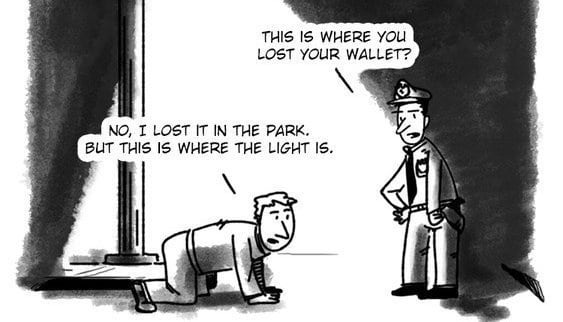Key Steps to a Successful Discovery Phase in Tech Projects
Treat tech changes like a house renovation
A policeman sees a drunk man searching for something under a streetlight and asks what the drunk has lost. He says he lost his keys and they both look under the streetlight together.
After a few minutes the policeman asks if he is sure he lost them here, and the drunk replies, no, and that he lost them in the park. The policeman asks why he is searching here, and the drunk replies, "this is where the light is".
—Wrong: Why Experts Keep Failing Us. David H. Freedman (2010)
Have you ever done a project with consultants?
You’ll—almost always—get a recommendation for the first phase of the project to be some form of discovery.
You may hear different names—Survey, Current State Analysis, Envision, Discovery—but the core point of the phase is to know what you’ll be working with.
Understanding the technical landscape before developing a tool is the homebuilding equivalent of a geotechnical survey—an essential first step in building a strong foundation for growth.
Unless you have experience managing large-scale, cross-functional projects under your belt, you might not know where to start your exploration.
Even worse, you may start by exploring technical areas easiest to explore—rather than ones that are most important!
How Should I Approach Discovery?
Treat a tech discovery like you’d approach buying a fixer-upper house1.
Define what you can *realistically* handle.
Don’t start a house buying process by touring turnkey mansions when your budget is more ‘teardown shack’.
Walk through the interior with the Realtor
Take note of what’s good2 and what you might change
Talk to the owners about what big-ticket maintenance they’ve done and what has been deferred
Keep a list of these—they’ll probably come up again later
Drive by at various times of the day and week to see what you notice.
Is the rush hour traffic really loud? Is there a weekend club nearby?
Once you have a good idea of what you’re getting yourself into, you can create timelines, prioritize projects, and budget. 3
For a business, discovery would be like this:
Define what you can *realistically* handle.
This is still the same. Don’t bite off more than you can chew
Walk through the
interior with the Realtortech stack with the relevant leader(s)Take note of what’s good and what you might change
Talk to
the ownersIT about what big-ticket maintenance they’ve done and what has been deferredKeep a list of these—they’ll probably come up again later
Drive byRun test cases and examine logs to see what you notice.Is ETL really the bottleneck? Does unstructured data mess you up
And you’d be able to plan for your project with your good understanding.
Customizable Checklist
Your situation will be different for each company and each project. Below, I have a structure for common things to include in a discovery phase.
Copy, edit, and customize it to your needs!
Pre-Work & Kickoff
Objective: Define the purpose(s) of the current state analysis.
Be intentional about adding things to the scope or keeping it out of scope. Scope creep is the #1 killer of projects!
Scope: Outline what aspects of technology will be covered
A good place to start is the People, Processes, Technology framework, as we do here
Kickoff Meeting: Hold a kickoff meeting with key stakeholders to understand goals, challenges, and competing priorities.
Don’t make the mistake of thinking that you get full, unfettered access to people already working a full job—this is usually on top of that
Documentation Review: Gather and review existing documentation on current technologies (tools), processes, and strategies.
Stakeholder Interviews: Conduct detailed interviews with stakeholders to understand the current state, what they want to add in, and current issues
Technology: Current Technology Inventory
Tool Inventory: Compile a list of all relevant tools and technologies currently used (and unused, but paid for)
Functionality Assessment: Figure out how—if at all—each tool is used
This can be helpful if you’re looking to consolidate roles and processes
Integration Mapping: Map out how these tools are integrated and how data flows between them.
This doesn’t have to look good to be helpful!
Technology: Data and Analytics Assessment
Data Sources: Identify where data comes from, and make a list of sources
Common ones are: POS data, financial market data, 3rd party enrichment, weather
Data Quality: Evaluate the quality and consistency of data.
Reporting: Assess the effectiveness of current reporting practices.
e.g. Figure out if anyone even uses that BI dashboard
Process: Process and Workflow Analysis
Process Mapping: Document current processes and workflows.
e.g. Who requests a feature? How does something get put into production? Who approves something?
Gap Analysis: Identify gaps and redundancies in current workflows.
Does John review the same doc twice in the process? Don’t make him do that
Customer Experience Analysis: Imagine you’re a customer and plot out what a buying process looks like.
People: Capability and Skills Assessment
Team Skills: Evaluate the skills and capabilities of the people on the team.
Training Needs: Identify areas where additional training or help is required.
Role and Capacity Alignment: Look through the roles and tasks required of them. Are they lined up correctly? Make sure you assign tasks in a way to avoid burnout.
Next Steps and Action Plan
Roadmap Development: Develop a roadmap for implementing the recommendations.
Prioritization: Prioritize initiatives based on impact and feasibility.
I always recommend the effort vs impact matrix
Resource Allocation: Plan for the necessary resources (budget, personnel, time) required for the next steps forward
Conclusion
Don’t be intimidated by kicking off a project, but don’t start changing things without a good idea of the whole scope of whats involved.
Feel free to reach out if you have questions on a specific project you’re working on.
Good luck!
In the days where houses weren’t bought sight unseen…
Every business has bad data somewhere. Keep the functioning parts at the front of your mind.
You’ll never be right on any of them, but they’re good to benchmark against anyway




